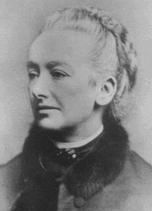 Amelia
B. Edwards Amelia
B. Edwards
1831-1892
English Novelist and Egyptologist
For scholarship and variety of
accomplishments, Amelia Edwards has had few
equals, especially in her own time. Edwards
enjoyed three separate careers. She was at
various times a journalist, a novelist, and an
Egyptologist. She was also an active supporter
of Woman’s Suffrage and as vice-president of the
Society for Promoting Women's Suffrage. Amelia
Edwards was born in London in 1831, the daughter
of an army officer who eventually became a
banker and a very well educated Irish mother.
Amelia was schooled at home for most of her
childhood under her mother’s tutelage with the
help of special tutors when necessary. Amelia
showed was recognized as a promising writer at a
very young age. Her first published work was a
poem, entitled "The Knights of Old", published
in a weekly journal when she was only seven
years old. For several years she continued to
write, but eventually turned to music and
composed several pleasant pieces. Later, she
returned to writing and decided to make it her
profession. Among her many novels were: "The
Ladder of Life", "Half a Million of Money", and
"Lord Breckenburg".
Though she was a popular
novelist, it is her traveler’s tales that are
reprinted today. When she was 30 years old
Amelia’s parent’s died, leaving her freeing her
to pursue her love of travel. With the money she
made from her writings, she was able to support
herself and live independently, going wherever
she wished. Amelia embarked on a series of
daring expeditions, writing of her adventures.
Her accounts are memorable for her knowledge of
her surroundings, her interest and openness
towards the people and customs of other
countries. Her books were also loved for the
humor and animated accounts of her experiences.
In 1870, Amelia and a woman
companion traveled to Egypt. This trip was to
change the course of her life. From this time
on, she came to be known chiefly as an
Egyptologist and wrote such works as "A Thousand
Miles up the Nile", "Pharaohs, Fellahs, and
Explorers". She also translated Maspero’s
"Egyptian Archeology", and wrote for the
Encyclopedia Britannica on Egyptology.
In 1889, Amelia lectured in the
United States. From those who heard her, she is
best described as an ‘antiquarian’ - one
possessing indomitable courage and will,
unswerving patience and energy, and an
impregnable constitution, besides the love of
discovering unrevealed history. Amelia Edwards
died on April 15, 1892 from a severe case of
influenza. She left behind an expansive library
of Egyptology and a collection of Egyptian
relics to University College, London.
This article may be re-published
as long as the following resource box is
included:
Patricia Chadwick is a freelance
writer and columnist in several online
publications. She is also editor of two
newsletters. History’s Women is weekly online
magazine highlighting the extraordinary
achievements of women. Subscribe at
www.historyswomen.com or by sending a blank
email to subscribe-h-w@ds.xc.org . Parents &
Teens is a twice monthly newsletter geared to
help parents connect with their teens. Subscribe
at www.parentsandteens.com or by sending a blank
email to subscribe-parent-teen@ds.xc.org.
|
|


 Amelia
B. Edwards
Amelia
B. Edwards 